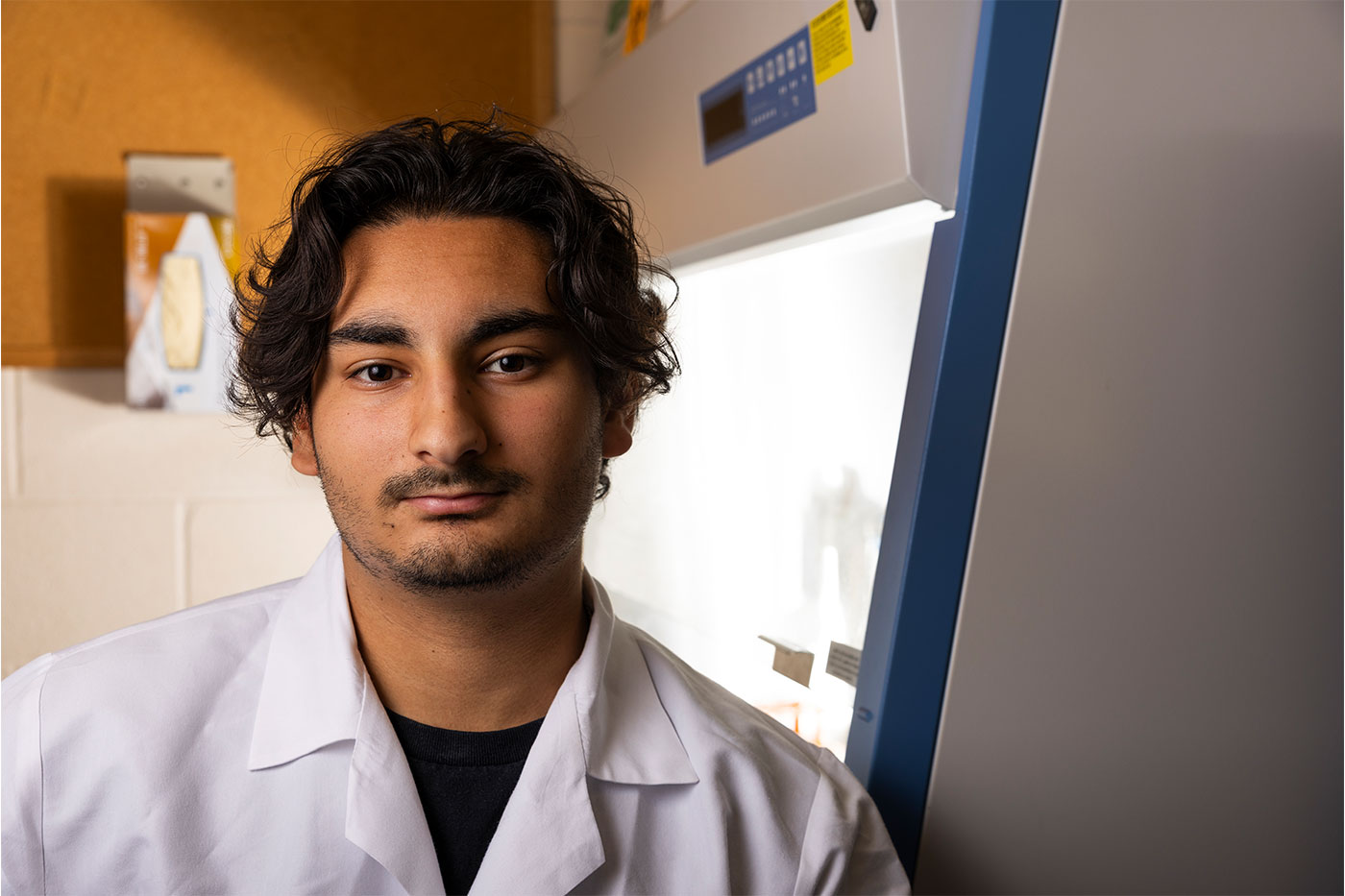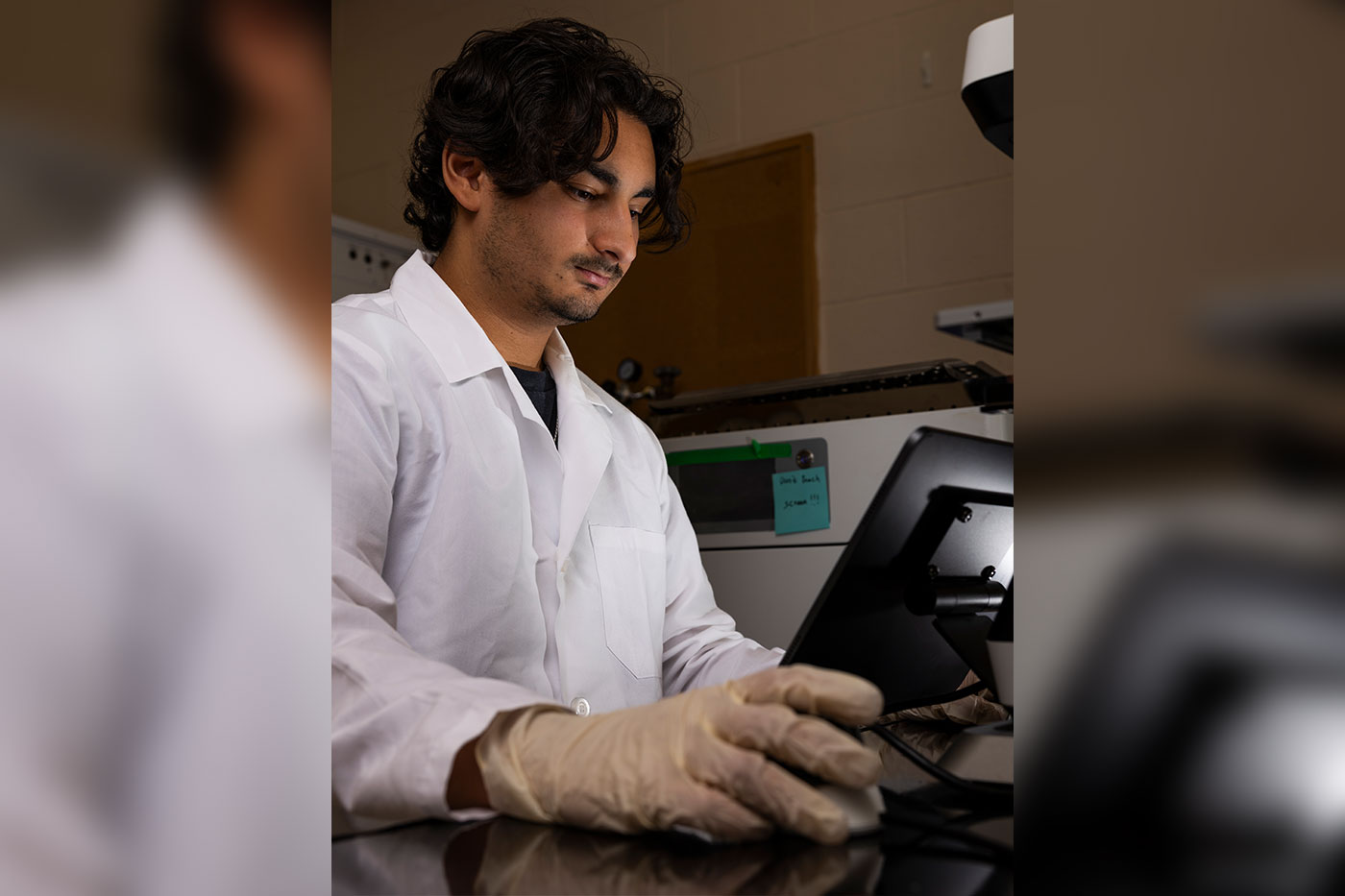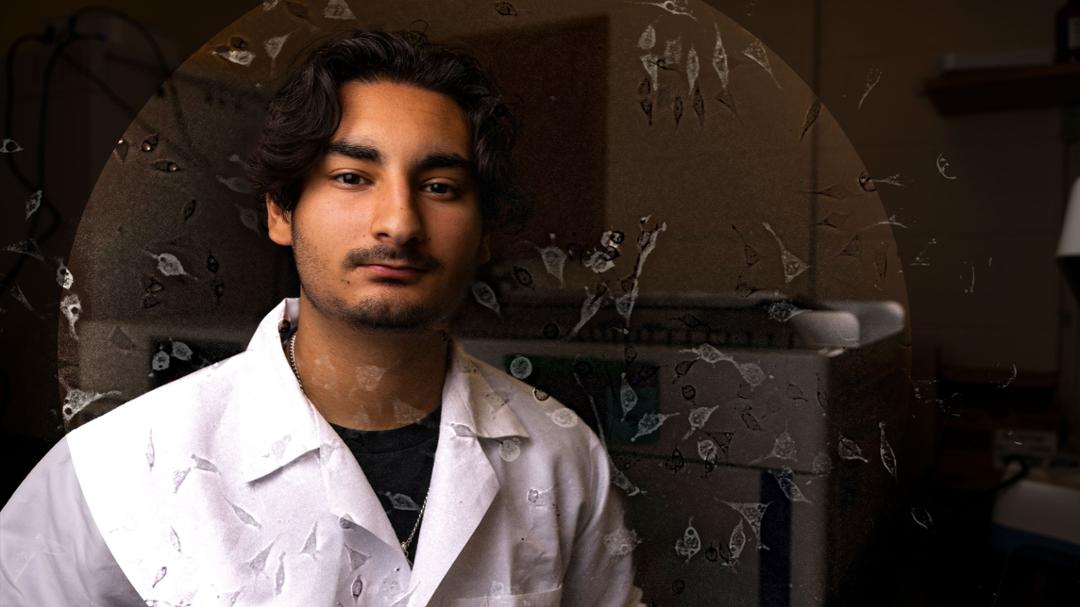This senior microbiology major has already been accepted to medical school, and Texas Tech provided the pathway, support and resources to help him get there.
This senior microbiology major has already been accepted to medical school, and Texas Tech provided the pathway, support and resources to help him get there.
As it turns out, Texas Tech University was just what Sy Bogutski was looking for – and possessed a few things he didn’t know he was looking for.
Sy initially was charmed by the school’s ABCs, its activities, its buzz and its community, and not necessarily in that order. For Sy, Texas Tech was comfortable and challenging. It rapidly became the place where he wanted to settle in and write the next chapter of his life.
“I came here because I visited the campus and I loved everything about it,” he said. “I just felt a sense of community here, which I guess sounds kind of corny to say, but it was very different from my high school that I had been used to.”
Ah, Sy’s high school. He grew up in north Dallas near the suburb of Richardson, but his prep school days were a different experience from many. He attended Dallas International School with everything taught in French.
Yes, you read that right.
Consequently, he spent a dozen years learning in French, not just the language, but subjects like math, science and history as well.
Sacrebleu, indeed.
By Sy’s estimation, there were about 20 in his graduating class, making Texas Tech and all it had to offer a substantial change. There was also one other driving motivation for attending Texas Tech: It was one of a limited number of schools offering the Undergraduate to Medical School Initiative (UMSI).
“They have a lot of incredible programs here,” he said, “but one they have is UMSI, where you apply to medical school in high school, and it’s unique to Texas Tech. I can name maybe a handful of other schools that do something similar, and they are in the northeast part of the country or Ivy League schools.”
The Honors College and the Texas Tech University Health Sciences Center are partners in the UMSI program, which is designed for students interested in becoming medical doctors. By meeting certain requirements and deadlines, a select group of first-year students entering the Honors College are guaranteed admission to TTUHSC School of Medicine upon completion of their bachelor’s degree at Texas Tech.
Sy, a fourth-year microbiology student in the Department of Biological Sciences, applied for the program, but unfortunately wasn’t accepted. However, the setback did nothing to deter his resolve.
Instead, he put his head down and worked hard for two years. Then, at the start of his third year he applied to the Early Acceptance Program (EAP). This allows students to apply to medical school a year earlier and likewise does not require them to take the MCAT if accepted.
This time, Sy was accepted, and he is scheduled to begin classes at the TTUHSC School of Medicine following graduation in the spring.
The Road to Texas Tech
Texas Tech first appeared on Sy’s radar when a friend decided to attend a year earlier. She had also applied to the same health care program and had plenty of good things to say about life on the Lubbock campus. Sy visited several times and was easily won over by all Texas Tech had to offer.
“The people here were just so nice,” he said. “The campus was nice. The programs were great, and we’re pretty good at sports, which is a pretty big part of it. It’s always fun to be able to go to football games or basketball games and know your teams are competitive. It just all felt like a really good fit.”

Sy had visited a couple of other Texas universities, but they did not give him the same sense of connection. Texas Tech, he came to realize, was just his style.
Another factor in Texas Tech’s favor was its status as a Carnegie Classification of Higher Education “Very High Research Activity” Institution. That really resonated with Sy, who is now doing cutting-edge work for which he has received national recognition in the lab of Ethan Chen.
His research involves tiny molecules called mirtrons, which have become important recently because some studies have shown they may play a large role in cancer and immune system problems.
Originally, Sy was a biochemistry major, but he changed his path midway through his first year after realizing chemistry didn’t hold his interest. He soon made the switch to microbiology.
“Because I was on the health care track, I felt like I needed to stand out,” he said. “I wanted to do something that would kind of make me follow my own path rather than just doing what a lot of pre-med researchers do.”
So far, his research team has unearthed several fascinating possibilities, including that cancer cells may produce specific mirtrons with a special shape that helps them avoid being broken down by the body. The mirtrons are packaged into small bubbles, called exosomes, and sent out of the cancer cell. Then, once outside, the mirtrons can interact with immune cells and may even disrupt how those cells respond to cancer.
The team is working to understand how cancer cells use the mirtrons to survive and hide from the immune system. According to Sy, the preliminary data indicate the mirtrons not only prevent immune cells from attacking the tumor, but they may also reprogram some of them to support and protect the cancer.
The thinking is if they can figure out how this process happens, it might open the door to novel ways of treating cancer through targeting the mirtrons. The work received the Portz Interdisciplinary Fellowship Award, and an accompanying $5,000 stipend, from the National Collegiate Honors Council, making Sy the first Texas Tech student to receive the prestigious and highly competitive national prize.
There’s more at stake here for Sy than that.
“It’s shown me how meaningful research can lead to real change, not just in the lab, but in people’s lives,” he said.
The impact of lab experiences
All of this comes as no surprise to Chen, an assistant professor who joined the Biological Sciences department in 2022 and focuses some of his research on tumor immunology. He said he and Sy became acquainted almost two years ago.
“He reached out and expressed a strong interest in joining my lab,” Chen recalled. “From the outset, he demonstrated a clear focus on pursuing research in the areas of immunology and epidemiology. This is something different from other undergraduate students who usually express interest to gain hands-on experience without a clear and defined interest in a specific research area.”
Sy knew he wanted to get into a lab and do meaningful work under the watchful eye of a mentor/researcher. He wasn’t sure, though, which path to take – and there were so many to choose from.
To his way of thinking, he might have idled too much during his first year as he transitioned to college life.
“I had been just getting used to Lubbock and getting used to being at college,” he recalled. "I applied to six or seven different labs, and I only heard back from two of them. One was working with mosquitoes, which didn’t sound too appealing to me, so I declined that offer.”
At first, Sy thought he had made a mistake because he went several weeks without any other lab offers. But then, he heard from Chen, whose research interests were much aligned with his own. It would be the opportunity to work with cancer cells and tumors and how they function.
“I thought that was super cool,” he said.
Chen invited Sy into his lab and gave him the space and confidence to grow. He also taught him the tools of the trade like how to culture cells from one plate to another without having them die during the process. Sy had found his happy place, calling the chance to work in Chen’s lab amazing.
Likewise, Chen values the working relationship the two have built.
“I have over 20 undergraduate researchers in my lab, and Sy stands out as the only one I’ve never had to worry about in terms of academic performance, research progress or overall responsibility,” he said. “He is remarkably creative and consistently brings fresh, insightful ideas to both his coursework and research, and he is exceptionally disciplined.”
Chen reinforces that last claim with numbers. Sy spends more than 20 hours a week in the lab but also stays busy with a number of extracurricular activities that includes tutoring other students. And he has maintained a 4.0 GPA throughout his academic career.
Not bad for a young man who thought his professional path might be more likely in engineering and who didn’t even really sniff a “real” biology class until college.
Then came that fateful day in high school when he had the opportunity to shadow an oncologist.
And everything changed.
“I thought it was just really, really interesting,” he said. “Everything he did fascinated me, especially being able to see patients. He was talking to them and then diagnosing them and then going over treatment plans. It was incredible, and it got me leaning toward health care.”
Family matters cemented his aspirations as several of Sy’s grandparents faced cancer.
“As I went into college, I realized that I wanted to do something related to health care,” he said. “I didn’t know if that was going to be pre-med or some other type of field that was research-based.”
Giving his all at Texas Tech
Since finding his place at Texas Tech, Sy has worked beyond academic endeavors to broaden his perspective. He has joined several cancer-focused organizations, giving him a window into the faces of people dealing with the disease.
One of these groups makes trips to the Joe Arrington Cancer Research & Treatment Center and the UMC Cancer Center and offers small gifts, including their presence and encouragement.
“We just try to be there for them,” he said. “We want to try and make their day just a little bit better because nobody really wants to be in a cancer center. That’s not a fun place to be.”
It’s that situational awareness and compassion for others that has caught the attention of colleagues in Sy’s lab, like Reagan Farrell.
“I really admire how Sy is so consistent and dedicated to his project,” Reagan said. “Thanks to his hard work, he has been able to propel the work of others and become a more independent researcher. He is very methodical and observant.”

Those qualities have Sy laser-focused on cancer research. He sees his medical future as a calling, the opportunity to give back to a community and to be the healing hands for others.
And he has the pen and paper for his next chapter, having already applied to and been accepted to medical school.
“Right now, a lot of my friends are applying, but this summer and the next year for me are like 10 times easier because I don’t have to worry about that anymore,” he said. “I already have a guaranteed spot. I just have to keep doing my thing, and I’ll be good.”
Years after landing in Lubbock, Sy has no regrets. Texas Tech delivered on everything he hoped it would – and more.
“It definitely exceeded my expectations,” he said. “Some of my friends at other schools are kind of struggling at this point and doing all these things while I’m relaxing. That’s one of the things that’s great about Texas Tech. There’s so many pathways that you can take to do what you want to do in the end.”
Sy said accessing financial assistance was vital, adding that faculty and Chen, his research professor, have been instrumental in his success. He was also grateful for the impact and influence of the Honors College, which helped shape him into who he is today.
Of course, Sy had a lot to do with that as well.
“Sy has consistently gone above and beyond what is expected at his academic level,” Chen said. “His contributions have already had a meaningful impact in the lab, and I have no doubt he will excel in any academic or professional environment. He is not only a talented scientist, but a kind and principled individual – an exceptional combination.”
Sy’s skills and talents will serve him well at his next stop, the TTUHSC, where a new set of demands and expectations await him. For now, he is leaning toward internal medicine, which is, no surprise, directly connected to oncology.
“For me, I’ve been able to do what I’ve done because of the people and resources here at Texas Tech,” he said. “Texas Tech really gives you a door to open up and look at all these possibilities for what you want to do. That’s what happened for me.”

